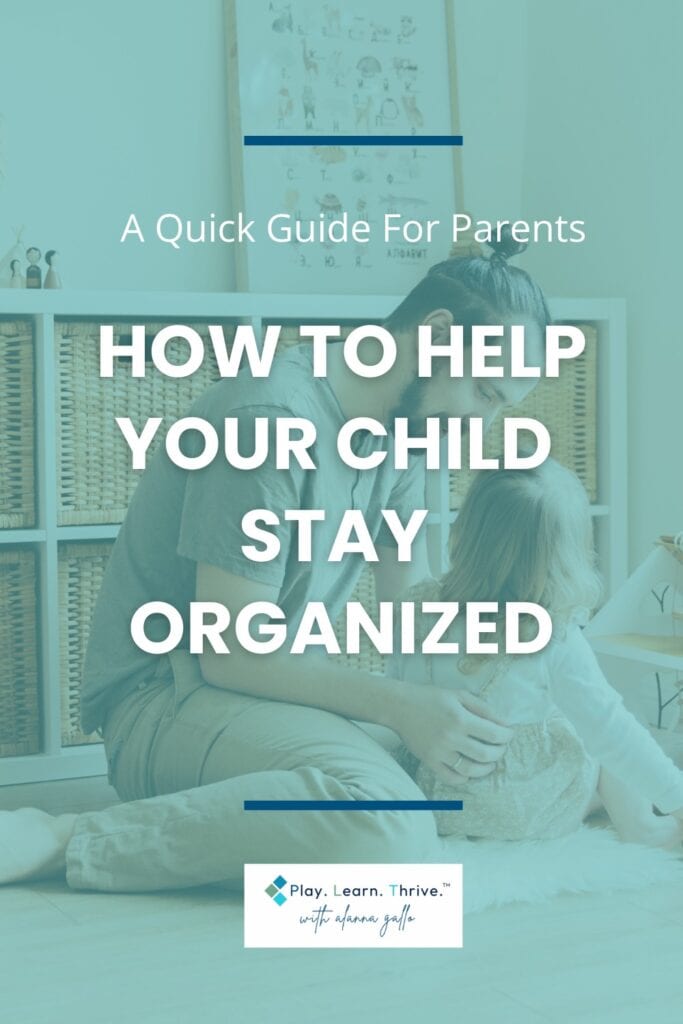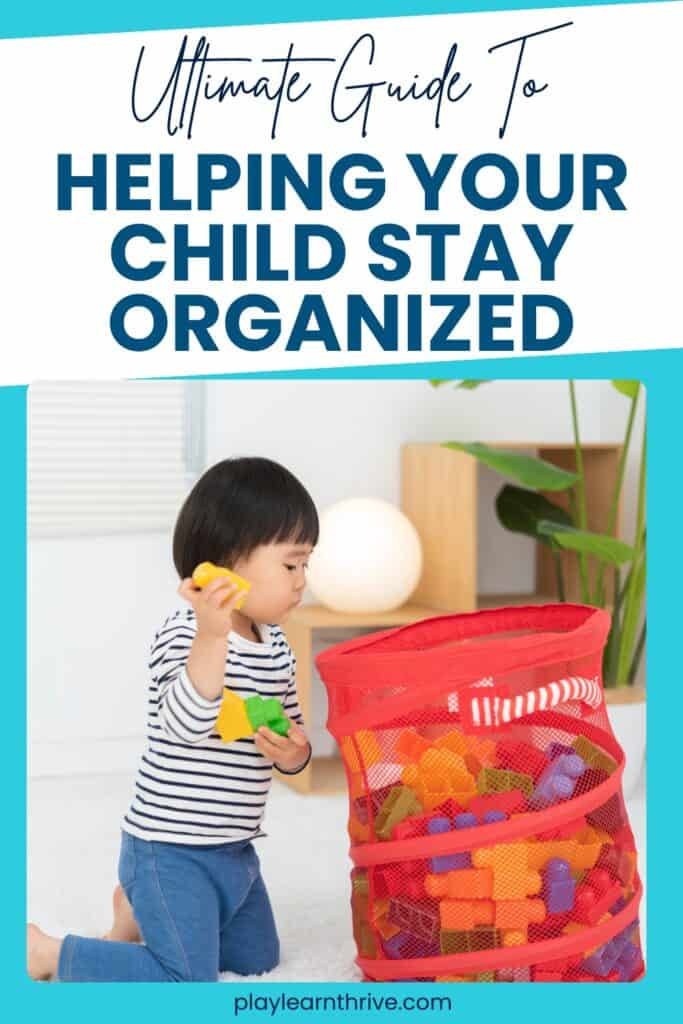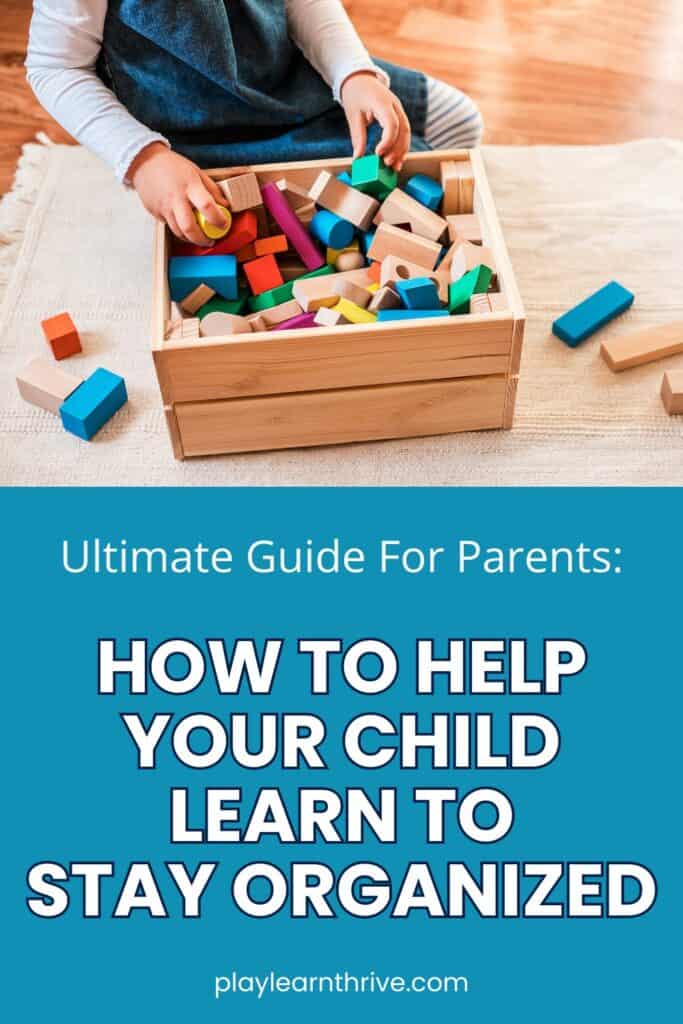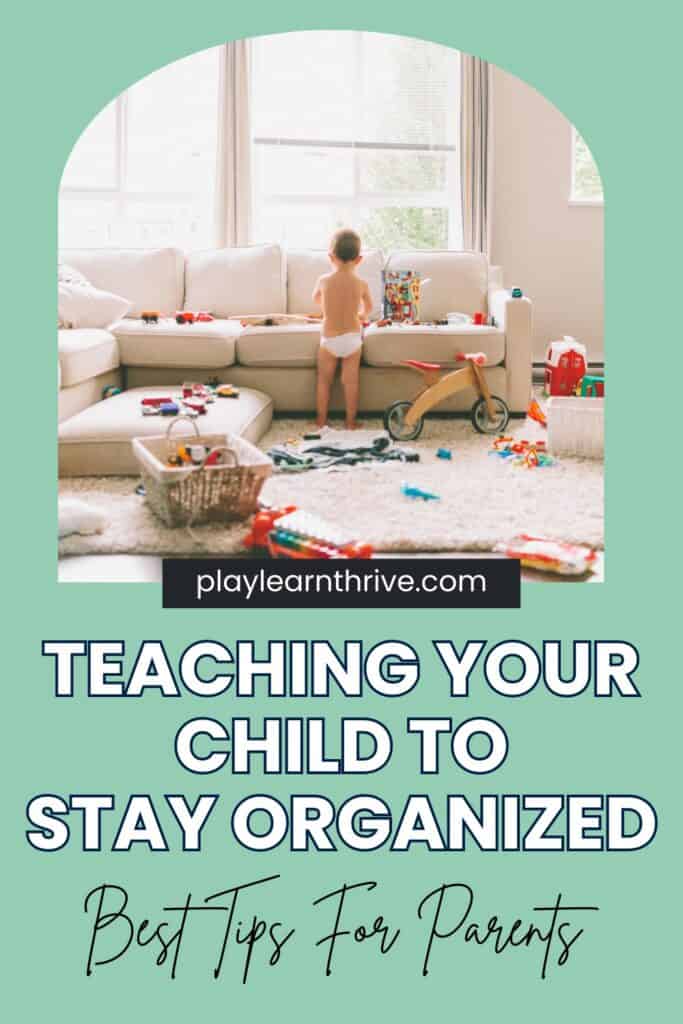How to Help a Child Stay Organized
Learn how to help a child stay organized with practical tips for building routines, managing responsibilities, and fostering independence—perfect for busy families and neurodiverse kids alike.

Play. Learn. Thrive.™ only endorses products we authentically love and use. Some of the product links in this post may be affiliate links. That means that if you click them and make a purchase, this site makes a commission. Play. Learn. Thrive.™ is also an Amazon Associate. As an Amazon Associate, we earn from qualifying purchases. It will have no impact on the price you pay or the experience of your purchase.
Staying organized is a crucial life skill that helps children succeed in school, manage responsibilities, and develop independence. However, organization isn’t something kids are born with—it’s a learned skill that requires practice, guidance, and patience.
For some children, staying organized comes naturally, while others struggle with keeping track of belongings, following routines, or completing tasks efficiently.
Factors like age, personality, and neurodiversity (such as ADHD) can play a significant role in how easily a child develops organizational skills.
As parents, understanding these challenges and providing the right support can help set children up for success in both their daily lives and future responsibilities.

Why Organization Matters for Children
Teaching children to be organized isn’t about neatness for the sake of neatness—it’s about developing essential skills they’ll use throughout life. When a child learns to manage their time, space, and belongings effectively, they experience several benefits:
- Less stress and anxiety – Knowing where things are and having a predictable routine reduces frustration and overwhelm.
- Better focus and productivity – Organized spaces and schedules help children complete tasks more efficiently.
- Increased independence – Kids who can manage their responsibilities feel more confident and capable.
- Improved academic success – Being able to keep track of homework, assignments, and supplies supports learning and performance in school.
- Stronger time management skills – Organization helps children understand prioritization and planning, skills they’ll need as they grow.
Developing organizational skills is a process, and every child will progress at their own pace. Some kids may need extra support, structure, and tools to help them develop these abilities effectively.
How Children Develop Organizational Skills
Children don’t wake up one day suddenly knowing how to keep their backpacks neat or their schedules in order. Instead, organization is a skill built over time through daily experiences, routines, and modeling from adults.
Stages of Organizational Development in Children
- Toddlers (Ages 2-4): Begin learning basic concepts like putting toys in bins or following simple routines such as brushing teeth before bed.
- Preschoolers (Ages 4-6): Understand basic categorization, such as sorting toys by type or helping set up a simple schedule.
- Elementary Kids (Ages 6-10): Develop time awareness and can begin managing homework, chores, and personal belongings with guidance.
- Tweens & Teens (Ages 10+): Become capable of planning ahead, managing multiple responsibilities, and using organizational tools like planners or calendars.
Not all children develop these skills at the same pace, and some may struggle more than others.

How ADHD and Executive Functioning Impact Organization
For children with ADHD or executive functioning challenges, staying organized can feel overwhelming. ADHD affects working memory, impulse control, and planning abilities, making it harder for kids to:
- Remember multi-step instructions such as “Put away your shoes, then grab your backpack, then get in the car.”
- Keep track of belongings, frequently losing homework, jackets, or toys.
- Manage time effectively, often underestimating how long a task will take or getting distracted before completing it.
- Follow routines independently without constant reminders.
If your child has ADHD or difficulties with organization, they aren’t lazy or careless—their brain simply processes tasks differently. With the right support and tools, children with ADHD can still develop strong organizational skills that work for their unique needs.
How Parents Can Help a Child Stay Organized
1. Set Up Simple, Visual Systems
Many children, especially those with ADHD, benefit from visual organization systems that show them exactly what to do.
- Use picture schedules with images showing morning and evening routines.
- Assign colors to different categories, such as red for school supplies and blue for toys.
- Create simple, step-by-step checklists for daily tasks like packing a backpack or getting ready for bed.
When organization is visible and easy to follow, children are more likely to stick with it.
2. Keep Spaces Clutter-Free and Kid-Friendly
Children struggle to stay organized if their environment is overwhelming.
- Reduce clutter by rotating toys and supplies to keep things manageable.
- Create designated spaces for belongings, such as a hook for backpacks, a tray for school papers, or a cubby for shoes.
- Use open storage like baskets and bins without lids to make it easier for kids to put things away independently.
A tidy, structured environment makes organization feel natural rather than forced.
3. Establish Routines and Predictable Structures
Consistent routines help kids understand what’s expected and create habits that become second nature.
- Have a set place for everything, such as coats always going on the same hook.
- Use timers for transitions, like giving a five-minute warning before cleanup time.
- Do things in the same order every day, such as unpacking backpacks, having a snack, and then starting homework.
When children know what to expect, they can navigate their responsibilities with less stress and fewer reminders.
4. Break Tasks Into Small, Manageable Steps
Many kids struggle with multi-step directions, especially those with ADHD. Chunking tasks into smaller steps makes them feel less overwhelming.
Instead of saying, “Go clean your room,” try:
- “Put all your dirty clothes in the hamper first.”
- “Now, put your books back on the shelf.”
- “Next, make your bed.”
Breaking tasks down reduces frustration and increases success.
5. Teach Time Awareness with Visual Timers
Many children don’t naturally understand how long things take. Help them manage time with:
- Visual timers to show how much time is left for a task.
- Calendars and planners so kids can see upcoming events and deadlines.
- Time-based challenges, such as “Can you finish putting away your toys before the timer goes off?”
When kids see time in a concrete way, they’re better able to plan and stay on track.
6. Encourage Ownership and Responsibility
Children are more likely to stay organized when they feel in control of their own space and tasks.
- Let them pick their own organizational tools, like choosing a planner or decorating a chore chart.
- Give choices, such as asking, “Would you rather clean up before or after snack?”
- Praise progress by focusing on effort rather than perfection, such as saying, “I love how you put all your books back on the shelf today!”
When children feel capable and in charge, they’re more motivated to keep things organized.
Ready to Cut Back on Screen Time?

Our free Screen-Free Starter Kit gives you gentle, research-backed strategies to reduce screen time and reconnect with your child—without guilt, tears, or power struggles.
✨ Create a calmer, more connected home—starting today.
Supporting Organization for the Long Run
Staying organized is a learned skill, not an innate trait. Some kids may pick it up quickly, while others, especially those with ADHD or executive functioning challenges, will need extra support, patience, and creative strategies.
By setting up structured routines, visual systems, and clear expectations, parents can help children develop lifelong organizational skills that will benefit them well beyond childhood. And remember—progress, not perfection, is the goal. Small improvements over time will lead to lasting success in managing responsibilities, schoolwork, and daily life.
Inspired by this post? Be sure to subscribe download my free Screen-Free Starter Kit! For more insights and resources on raising confident, lifelong learners, be sure to follow me on Instagram – can't wait for you to join me!






